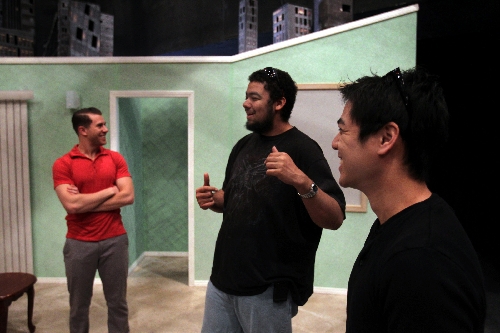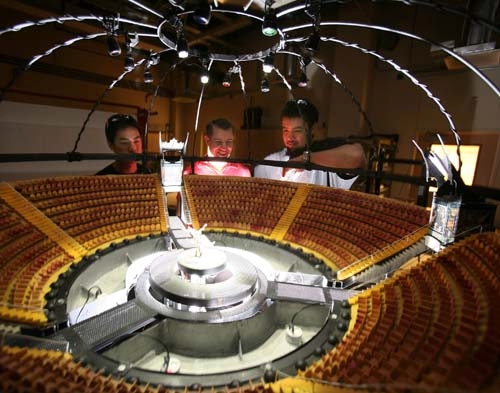UNLV entertainment engineering grads make impression on shows



Alan Holton was studying engineering at Purdue University a few years ago when he had a revelation: This is boring.
So he packed up his stuff and moved to Las Vegas.
Specifically, he transferred out of mechanical engineering at Purdue and into entertainment engineering at UNLV.
Entertainment engineering was a then-new program that combines the rigor of engineering with the creativity of art. He’d read an article about it, and then looked into it a bit more.
It’s basically about training smart scientist types to use their powers for the good of us all by making the entertainment industry better.
“Basically, we do anything and everything to do with the entertainment industry,” said Holton, 23. Design and build the sets, figure out how to make the machinery work, make the sound and the lighting just right. That sort of thing.
And now, Holton, who plans on going to graduate school next year, and four classmates are about to become the program’s first graduating class, joining a student who graduated last fall.
The program began four years ago.
The 100-plus students in the program almost didn’t make it at all. Twice in recent years, entertainment engineering has been on a list of those the university was considering eliminating because of budget cuts.
In the end, though, it survived.
And it’s still the only program of its kind in the country.
“We have the biggest laboratory in the world in our backyard,” said Joe Aldridge, a UNLV fine arts professor and one of the program’s main advisers.
Aldridge, who began his career as a stagehand, said the industry has changed a lot in recent years.
A college education is more important, and so are engineering skills. It is no longer OK to learn the job while on the job, he said.
Take any of the Cirque du Soleil shows, for example. Maybe “Ka” at the MGM Grand.
That show features a massive stage that lifts into the air and twists and turns, all while performers are doing their thing on it.
It’s not just a stage and an audience.
“That is the prototype,” Aldridge said. “There’s nothing like it in the industry.”
Someone had to think it up. Someone had to figure out how to build it. Someone had to actually build it. And someone has to fix it when it breaks.
That’s where a program like the one at the University of Nevada, Las Vegas comes in, he said.
The program is housed in both the College of Engineering and the College of Fine Arts, which is unusual.
Aldridge said the content is about 50/50 between the two, depending on whether a student concentrates more on the engineering or more on the design.
Either way, they’re getting courses they wouldn’t get in an entertainment program based solely out of the fine arts college, or an engineering program that had little to do with entertainment.
Take Oliver Sangalang, for example, who is also about to graduate.
He’s 24. He’s from Las Vegas. He’d always been interested in graphic design, but he studied mechanical engineering at UNLV.
Then the entertainment engineering program started, and it was like he found his calling. There was some risk, sure.
“You’re going into a program that’s brand new, not established,” he said.
But he did it anyway.
“I feel like I lucked out that this started when it did,” he said.
He’s applying for internships now, but he’s still open about what type of work he wants to do, specifically.
Student Jeremy Knowles, 23, is going to graduate from the program in December. He’s also from Las Vegas. He studied theater in high school, but he started out at UNLV as a business major.
He jumped at the chance to sign up for entertainment engineering when a friend told him about it.
He’s always loved the entertainment industry, has even done some behind-the-scenes work and a bit of acting.
Add in the fact that Knowles said he’s always been a bit of a math and science nerd, and he thinks he’s found the perfect field.
Which is good for him, because he’s already got a behind-the-scenes job at the MGM, working as a special projects artist for various conventions, parties, weddings and other gatherings.
He isn’t sure if it’s going to be a permanent job or something else, but he’s glad he had his portfolio of things he’s accomplished at UNLV to help him get the job.
“I’m just trying to make connections,” he said. “See what happens.”
Contact reporter Richard Lake at rlake@reviewjournal.com or 702-383-0307.












